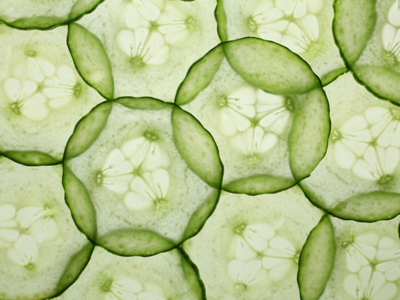
Ask the AI Tutor
Need help with Food 01? Ask our AI Tutor!
AI Tutor - Lucy
Connecting with Tutor...
Please wait while we establish connection

Cucumbers contain little or no carbohydrates.
Food 01
Food provides the energy and nutrients our bodies need to live and grow. In KS3 Science, pupils explore balanced diets, food groups, and the importance of nutrition.
1 .
What are proteins used for?
Bones and teeth
Energy
Growth and repair
Healthy blood
Proteins are long chains of different amino acids
2 .
What are carbohydrates used for?
Bones and teeth
Energy
Growth and repair
Healthy blood
They provide energy through respiration
3 .
What are fats in our diet mainly used for?
Bones and teeth
Growth and repair
Healthy blood
Stored energy
As well as stored energy, they provide insulation
4 .
What are small amounts of vitamins needed for?
Bones and teeth
Chemical reactions in the body
Digestion
Respiration only
If your chemical reactions don't work properly all sorts of things can start to go wrong with your body
5 .
Iron, a mineral, is needed for what?
Bones and teeth
Cell chemistry
Energy
Healthy blood
Calcium, also a mineral, is needed for bones and teeth
6 .
Fibre is needed for what?
Cell chemistry
Energy
Healthy blood
Preventing constipation
It also helps prevent bowel cancer
7 .
Which of the following foods contain little or no protein?
Beans
Butter
Fish
Meat
Butter contains mainly fat
8 .
Which of the following foods contain little or no carbohydrates?
Bread
Cucumber
Pasta
Potatoes
A cucumber is a good source of vitamins and minerals
9 .
Which of the following foods contain little or no fibre?
Apples
Carrots
Cheese
Peas
Fresh fruit and vegetables contain vitamins and fibre
10 .
Which of the following contains most calcium?
Cheddar cheese
Green vegetables
Meat
Oranges
Milk-based products are a good source of calcium
**Unlimited Quizzes Await You! 🚀**
Hey there, quiz champ! 🌟 You've already tackled today's free questions.
Ready for more?
Ready for more?
🔓 Unlock UNLIMITED Quizzes and challenge yourself every day. But that's
not all...
not all...
🔥 As a Subscriber you can join our thrilling "Daily Streak" against other
quizzers. Try to win a coveted spot on our Hall of Fame Page.
quizzers. Try to win a coveted spot on our Hall of Fame Page.
Don't miss out! Join us now and keep the fun rolling. 🎉
**Unlimited Quizzes Await You! 🚀**
Hey there, quiz champ! 🌟 You've already tackled today's free questions. Ready for more?
🔓 Unlock UNLIMITED Quizzes and challenge yourself every day. But that's not all...
🔥 As a Subscriber you can join our thrilling "Daily Streak" against other quizzers. Try to win a coveted spot on our Hall of Fame Page.
Don't miss out! Join us now and keep the fun rolling. 🎉






